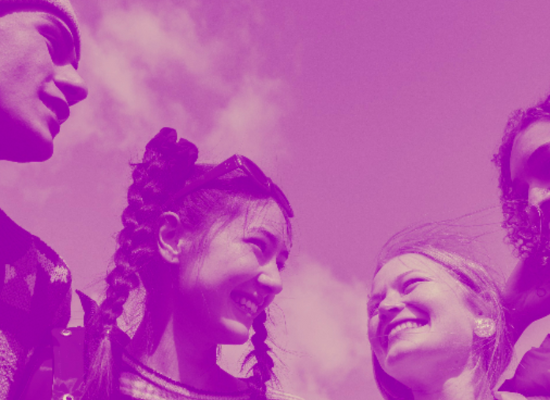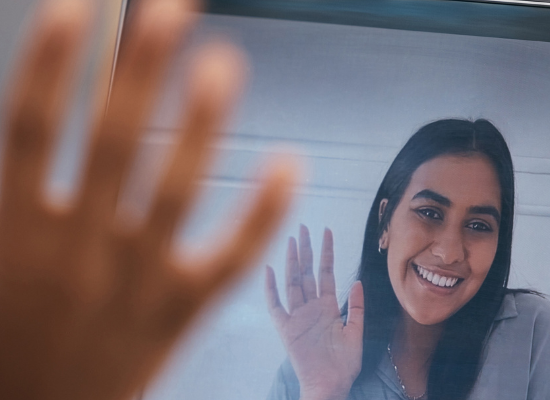
Stephanie Hepburn is a writer in New Orleans. She is the editor in chief of #CrisisTalk. You can reach her at .
When Seth Kahan was 10 years old, his mother developed schizophrenia. Despite his father’s efforts, finding her adequate care in 1969 was next to impossible. “My home life was completely disrupted — our family fell apart,” he says. He left home at 16 and never returned.
Today, Kahan is the grand challenge adviser to the Huntsman Mental Health Institute at the University of Utah’s nationwide mental health and substance use disorder anti-stigma grand challenge. Stigma, says the Visionary Leadership founder and CEO, is what splintered his family. “I never told my teachers or any adults close to me that my mother suffered from a mental illness,” he points out. “I’d go party with my friends but wouldn’t tell them either.” He highlights that if he’d had support, maybe he wouldn’t have left home.
Kahan’s father — a professor of journalism at the University of Texas at Austin determined to improve the mental health system — secured a grant from the National Institute of Mental Health and the National Mental Health Association (now Mental Health America). “It was a million-dollar grant, which, in 1972, when he got the grant, was a lot more than it is today,” he laughs. “My dad trained cohorts of graduate students how to do public relations for mental health causes.”
Kahan grew up in the mental health space, tagging along with his father as he developed and attended mental health conferences on serious mental illness, child and adolescent mental health, and drug education. “He was trying to keep me close, take care of my mom, and hold down a job, so a lot of the time, I was just with him,” says Kahan.
He went to college for mathematics and did street theater. In 1989, he began his 13-year tenure at the World Bank, where he had the opportunity to witness multibillion-dollar projects. “I got to see projects succeed and fail and talk to the people running them to find out what was working and what wasn’t,” he says. As an officer of the internationally acclaimed World Bank Knowledge Management program, he worked on taking “the invisible knowledge in people’s brains” and turning it into an asset for the organization. The program went from zero to $60 million in funding in two short years. “I was good at it,” he says.
The World Bank university-like environment reminded him of his childhood tagging along with his dad. There are 189 partners, each a nation. “Even though the offices are in Washington, D.C., it’s not a U.S. organization and has no cultural majority,” points out Kahan. “It felt like a mini United Nations.”
The multilateral environment allowed Kahan to thrive, gaining experience and exposure as an agent of change on large-scale World Bank initiatives. It’s a skill set he’s incorporated into developing Visionary Leadership’s systems model for change. The six vital areas of influence to successfully address a grand challenge are interpersonal relationships, local, state and federal policies, personal beliefs, places of work and regional communities. “A grand challenge is a big, bold goal to solve a socially intractable problem,” he says. “I help leaders conceive, design and get their grand challenge off the ground.” In addition to the anti-stigma grand challenge, he’s used the model to improve global well-being, improve the health of nurses, lower maternal and fetal mortality rates, and create a more diverse and sustainable finance planning profession.
Today, Kahan’s helping the Huntsman Mental Health Institute tackle mental health and substance use disorder stigma.
While working for the National Academies of Science Engineering and Medicine, he met Dr. Darrell Kirch, president emeritus of the Association of American Medical Colleges. Kirch is also the executive adviser to Dr. Mark Hyman Rapaport, CEO of the Huntsman Mental Health Institute.
In 2019, the Huntsman family gave $150 million to the University of Utah to start the Huntsman Mental Health Institute. Their beloved sister, Kathleen Ann Huntsman, died by suicide nine years before. Initially, the family said Kathleen died of complications following a cardiac arrest. In 2020, her brother, former Utah governor Jon M. Huntsman Jr., told Cache Valley Daily that, as a family, they were unwilling to talk about her suicide. “No, we were embarrassed. We didn’t want anyone to know. I wrote my sister’s obituary 10 years ago and I made no mention of the way in which she passed…” He went on to say that leaders need to examine mental health needs the same way they do other areas like energy and water and economic development. “We need to figure out what kind of mental health infrastructure we need to address our problem.”
In April 2022, the Huntsman Mental Health Institute at the University of Utah announced the challenge. Six months later, they hosted the anti-stigma grand challenge mental health design summit in Utah. At the summit, Christena Huntsman Durham, Kathleen’s sister, talked with KSL-TV about the role of stigma. “This is something that affects every single one of us,” she said. “Because the stigma is so great that that is the number one reason that people do not get help….”
Challenging stigma requires a comprehensive, collaborative effort. Kahan highlights that 175 leaders came from around the nation to participate in the design summit. The objective was to share the anti-stigma strategy and give the organizations an opportunity to “tear it apart.” “We wanted them to tell us where we were weak,” he says. Participants were encouraged that the leadership team includes people living with schizophrenia, generalized anxiety disorder, and substance use disorders. However, they highlighted insufficient diversity, equity and intersectionality, with Black participants not seeing themselves in the anti-stigma challenge’s leadership. “That pushed us to include more African Americans in leadership positions and have a diversity lens on everything we do.”
Partnering organizations must have a high level of commitment. “The CEO or a senior executive from the organization must be on the national leadership steering team, which includes monthly 90-minute meetings and a 48-hour email turnaround,” he says. The organizations also staff the challenge’s committees — justice, equity, diversity and inclusion, partnership, communication, policy, financial strategies and metrics. “It’s not a glory gig — they have real work to do and we expect a large investment of staff time and talent.”
The anti-stigma grand challenge also partners with the Ad Council, which creates, distributes and promotes public service announcements, for a multiyear mental health campaign initiative. Coming out of the pandemic, the nonprofit ran independent research, identifying the many mental health challenges people face. “It was the next frontier they wanted to address,” says Kahan. However, that takes money, and the Ad Council was trying to raise $15 million to implement a major national campaign. The Huntsman Mental Health Institute provided the $15 million and pledged to raise another $50 million to support the campaign. “If the Ad Council has $50 million in cash, they’ll likely raise $250 to $350 million in in-kind donations.”
Kahan points out that the Ad Council partners with top marketing agencies to write and create content and works with broadcast companies to obtain the best airtime placement — like during the Super Bowl. Scientific advisers are working with the Ad Council to ensure the advertising content is evidence-based. Among them are Dr. Mark Hyman Rapaport, CEO of the Huntsman Mental Health Institute, and Dr. Saul Levin, CEO and medical director of the American Psychiatric Association, both of whom are also on the grand challenge’s national leadership team.
The anti-stigma grand challenge aims to create a safe societal space for people to openly discuss mental health challenges without delay. “If you break your leg, you don’t wait six months to get help,” says Kahan. Largely because of the pandemic, there’s increased awareness of mental health, which has fostered momentum for the anti-stigma grand challenge to build on. “As we’ve been doing the work, I see stigma breaking down because we’re sharing with each other our own experiences. I’m now starting many conversations as I did with you, saying, ‘My mother developed schizophrenia when I was 10.’”
Kahan thinks a lot about what his childhood might have been had the barrier of mental health stigma not been in the way. “If stigma hadn’t existed, we would’ve gotten help faster and my family might have hung together.” He shares it’s long been time for society to stop otherizing people. “Mental health impacts all of us.”









